- Home
- Tad Williams
To Green Angel Tower Volume 2 Page 6
To Green Angel Tower Volume 2 Read online
Page 6
They rode on beside the Stefflod, which glowed silver in the moon’s ghostly light. Miriamele remained uncommunicative, and it seemed to Simon that they rode for days on end, although the moon had not yet moved much past the midpoint of the sky. Bored, he watched Miriamele, admiring how her fair skin took the moonlight, until she, irritated, told him to stop staring at her. Desperate for diversion, he then considered the Canon of Knighthood and Camaris’ teachings; when that failed to hold his interest for more than half a league, he quietly sang all the Jack Mundwode songs he knew. Later, after Miriamele had rebuffed several more attempts at conversation, Simon began counting the stars that dotted the sky, numerous as grains of salt spilled on an ebony tabletop.
At last, when Simon was certain that he would soon go mad—and equally certain that a full week must have passed during this one long night—Miriamele reined up and pointed to a copse of trees standing on a low hill some three or four furlongs from the wide rut of the infant road.
“There,” she said. “We’ll stop there and sleep.”
“I don’t need to sleep yet,” Simon lied. “We can ride longer if you want to.”
“There’s no point. I don’t want to be out in the open in daylight tomorrow. Later, when we’re farther away, we can ride when it’s light.”
Simon shrugged. “If you say so.” He had wanted this adventure, if that was what it was, so he migh as well endure it as cheerfully as possible. In the first moments of their escape he had imagined—during those few brief instants in which he had allowed himself to think at all—that Miriamele would be more pleasant once the immediate worry of discovery had lessened. Instead, she had seemed to grow even more morose as the night wore on.
The trees at the top of the hill grew close together, making an almost seamless wall between their makeshift camp and the road. They did not light a fire—Simon had to admit he could see the wisdom of that—but instead shared some water and a little wine by moonlight, and gnawed on a bit of Miriamele’s bread.
When they had wrapped themselves in their cloaks and were lying side by side on their bedrolls, Simon suddenly found that his weariness had fled—in fact, he did not feel the least bit sleepy. He listened, but although Miriamele’s breathing was quiet and regular, she did not sound like she was sleeping either. Somewhere in the trees, a lone cricket was gently sawing away.
“Miriamele?”
“What?”
“You really should tell me where we’re going. I would do better as your protector. I could think about it and make plans.”
She laughed quietly. “I’m certain that’s true. I will tell you, Simon. But not tonight.”
He frowned as he stared up at the stars peeping through the branches. “Very well.”
“You should go to sleep now. It will be harder to do once the sun is up.”
Did all women have a little Rachel the Dragon in them? They certainly seemed to enjoy telling him what he should do. He opened his mouth to tell her he didn’t need any rest just yet, but yawned instead.
He was trying to remember what he had meant to say even as he passed over into sleep.
In the dream Simon stood on the edge of a great sea. Extending from the beach before him was a thin causeway of land that extended out right through the teeth of the waves, leading to an island some long distance offshore. The island was bare except for three tall white towers which shimmered in the late afternoon sun, but the towers were not what interested Simon. Walking on the island before them, passing in and out of their threefold shadow, was a tiny figure with white hair and a blue robe. Simon was certain it was Doctor Morgenes.
He was considering the causeway—it would be easy enough to walk across, but the tide was growing higher, and soon might cover the thin spit of land entirely—when he heard a distant voice. Out on the ocean, midway between the island and the rocky shoal where Simon stood, a small boat was rocking and bobbing in the grip of strong waves. Two figures stood in the boat, one tall and solid, the other small and slender. It took a few moments to recognize Geloë and Leleth. The woman was calling something to him, but her voice was lost in the roar of the sea.
What are they doing out in a boat? Simon thought. It will be night soon.
He moved a few steps out onto the slender causeway. Geloë’s voice wafted to him across the waves, barely audible.
“... False!” she cried. “It’s false... !”
What is false? he wondered. The spit of land? It seemed solid enough. The island itself? He squinted, but although the sun had now dropped low on the horizon, turning the towers into black fingers and the shape of Morgenes into something small and dark as an ant, the island seemed indisputably substantial. He took another few steps forward.
“False!” Geloë cried again.
The sky abruptly turned dark, and the roar of the waves was overwhelmed by the cry of rising wind. In an instant the ocean turned blue and then blue-white; suddenly, all the waves stiffened, freezing into hard, sharp points of ice. Geloë waved her arms desperately, but the sea around her boat surged and cracked. Then with a roar and an out-wash of black water as alive as blood, Geloë, Leleth, and the boat disappeared beneath the frozen waves, sucked down into darkness.
Ice was creeping up over the causeway. Simon turned, but it was now as far back to the beach as it was toward the island, and both points seemed to be receding from him, leaving him stranded in the middle of an ever-lengthening spit of rock. The ice mounted higher, crawling up to his boots....
Simon jerked awake, shivering. Thin dawn light filled the copse and the trees swayed to a chill breeze. His cloak was curled in a hopeless tangle around his knees, leaving the rest of him uncovered.
He straightened the cloak and lay back. Miriamele was still asleep beside him, her mouth partially open, her golden hair pushed out of shape. He felt a wave of longing pass over and through him, and at the same time a sense of shame. She was so defenseless, lying here in the wilderness, and he was her protector—what sort of knight was he, to have such feelings? But he longed to pull her close to him, to warm her, to kiss her on that open mouth and feel her breath on his cheek. Uncomfortable, he rolled over and faced the other direction.
The horses stood quietly where they had been tied, their harnesses wrapped around a low-hanging tree branch. The sight of the saddlebags in the flat morning light suddenly filled him with a hollow kind of sadness. Last night this had seemed a wild adventure. Now, it seemed foolish. Whatever Miriamele’s reasons might be, they were not his own. He owed many, many debts—to Prince Josua, who had lifted him up and knighted him; to Aditu, who had saved him; to Binabik, who had been a better friend than he deserved. And there were also those who looked up to Simon as well, like Jeremias. But he had deserted them all on a moment’s whim. And for what? To force himself on Miriamele, who had some sad purpose of her own in leaving her uncle’s camp. He had left the few people who wanted him to tag along after someone who did not.
He squinted at his horse and felt his sadness deepen. Homefinder. That was a pretty name, wasn’t it? Simon had just run away from another home, and this time there was no good reason for it.
He sighed and sat up. He was here and there was little to be done about it, at least right now. He would try again to talk Miriamele into going back when she woke up.
Simon pulled his cloak about him and got to his feet. He untied the horses, then stood at the edge of the copse and peered cautiously around before leading them down the hill to the river to drink. When he brought them back, he tied them to a different tree where they could easily reach the long shoots of new-grown grass. As he watched Homefinder and Miriamele’s unnamed steed contentedly break their fast, he felt his mood lighten for the first time since awakening from his frightening dream.
He gathered up deadwood from around the copse, taking only what seemed dry enough to burn with little smoke, and set about making a small fire. He was pleased to see that he had brought his flint and striking-steel, but wondered how long it would be u
ntil he discovered something he needed just as much but had forgotten in the hurry to leave camp. He sat before the fire for a while, warming his hands and watching Miriamele sleep.
A bit later, as he was looking through the saddlebags to see what there might be to eat, Miriamele began to toss in her sleep and cry out.
“No!” she mumbled. “No, I won’t ...” She half-raised her arms, as though to fight something off. After watching in consternation for a moment, Simon went and kneeled beside her, taking her hand.
“Miriamele. Princess. Wake up. You’re having a bad dream.”
She tugged against his grip, but strengthlessly. At last her eyes opened. She stared at him, and briefly seemed to see someone else, for she brought her free hand up as though to protect herself. Then she recognized him and let the hand fall. Her other hand remained clutched in his.
“It was just a bad dream.” He squeezed her fingers gently, surprised and gratified by how much larger his hand was than hers.
“I’m well,” she muttered at last, and drew herself up into a sitting position, pulling the cloak tightly about her shoulders. She glared around at the clearing as though the presence of daylight was some silly prank of Simon’s. “What time of day is it?”
“The sun’s not over the treetops yet. Down there, I mean. I walked down to the river.”
She didn’t reply, but clambered to her feet and walked unsteadily out of the copse. Simon shrugged and went back to his search for something on which they could break their fast.
When Miriamele returned a short time later, he had turned up a lump of soft cheese and round loaf of bread; he had split the latter open and was toasting it on a stick over the small fire. “Good morning,” she said. She looked tousled, but she had washed the dirt from her face and her expression was almost cheerful. “I’m sorry I was so cross. I had a ... a terrible dream.”
He looked at her with interest, but she did not elaborate. “There’s food here,” he said.
“A fire, too.” She came and sat near, holding out her hands. “I hope the smoke doesn’t show.”
“It doesn’t. I went out a little way and looked.”
Simon gave Miriamele half the bread and a hunk of the cheese. She ate greedily, then smiled with her mouth full. After swallowing, she said: “I was hungry. I was so worried last night that I didn’t eat.”
“There’s more if you want it.”
She shook her head. “We have to save it. I don’t know how long we’ll be traveling and we may have trouble getting more.” Miriamele looked up. “Can you shoot? I brought a bow and a quiver of arrows.” She pointed to the unstrung bow hanging beside her saddle.
Simon shrugged. “I’ve shot one, but I’m no Mundwode. I could probably hit a cow from a dozen paces or so.”
Miriamele giggled. “I was thinking of rabbits or squirrels or birds, Simon. I don’t think there will be many cows standing around.”
He nodded sagely. “Then we’d better do as you say and save our food.”
Miriamele sat back and placed her hands on her stomach. “As long as the fire’s going ...” She stood and went to her saddlebags. She brought out a pair of bowls and a small drawstring sack and returned to the fire, then placed two small stones in the embers to heat. “I brought some calamint tea.”
“You don’t put salt and butter in it, do you?” Simon asked, remembering the Qanuc and their odd additions.
“Elysia’s mercy, no!” she said, laughing. “But I wish we had some honey.”
While they drank the tea—Simon thought it a great improvement on Mintahoq aka—Miriamele talked about what they would do that day. She did not want to resume riding until sundown, but there were other things to be accomplished.
“You can teach me something about swordplay, for one thing.”
“What?” Simon stared at her as though she had asked him to show her how to fly.
Miriamele gave him a scornful glance, then got up and walked to her saddlebag. From the bottom she drew out a short sword in a tooled scabbard. “I had Freosel make it for me before we left. He cut it down from a man’s sword.” Her disdainful look gave way to a wry, strangely self-mocking grin. “I said I wanted it to protect my virtue when we marched on Nabban.” She looked hard at Simon. “So teach me.”
“You want me to show you how to use a sword,” he said slowly.
“Of course. And in turn, I will show you how to use a bow.” She raised her chin slightly. “I can hit a cow at a great deal more than a few paces—not that I have,” she said hurriedly. “But old Sir Fluiren taught me how to shoot a bow when I was a little girl. He thought it was amusing.”
Simon was nonplussed. “So you are going to shoot squirrels for the dinner pot?”
Her expression turned cool again. “I didn’t bring the bow for hunting, Simon—the sword, either. We are going somewhere dangerous. A young woman traveling these days would be a fool to go unarmed.”
Her calm explanation made him suddenly cold. “But you won’t tell me where.”
“Tomorrow morning. Now come—we’re wasting time.” She picked up the sword and drew it from the scabbard, letting the leather slide to the wet ground. Her eyes were bright, challenging.
Simon stared. “First, you don’t treat your scabbard that way.” He picked it up and handed it to her. “Put the blade away, then buckle on the sword belt.”
Miriamele scowled. “I already know how to buckle a belt.”
“First things first,” Simon said calmly. “Do you want to learn or not?”
The morning passed, and Simon’s irritation at having to teach swordsmanship to a girl passed with it. Miriamele was fiercely eager to learn. She asked question after question, many of which Simon had no answer to, no matter how much he wracked his memory for all the things Haestan, Sludig, and Camaris had tried to teach him. It was hard to admit to her that he, a knight, did not know something, but after a few short but unpleasant exchanges he swallowed his pride and said frankly that he did not know why a sword’s hilt only stuck out on two sides and not all around, it just did. Miriamele seemed happier with that answer than she had been with his previous attempts at mystification, and the rest of the lesson passed more swiftly and pleasantly.
Miriamele was surprisingly strong for her size, although when Simon thought about what she had been through his surprise was less. She was quick as well, with good balance, although she tended to lean too far forward, a habit that could quickly prove fatal in an actual fight, since almost any opponent would be larger than she was and have a longer reach. All in all, he was impressed. He sensed that he would quickly run out of new things to tell her, and then it would just be practice and more practice. He was more than a little glad they were sparring with long sticks instead of blades; she had managed during the course of the morning to give him a few nasty swipes.
After they took a long pause for water and a rest, they changed places: Miriamele instructed Simon in the care of the bow, paying special attention to keeping the bowstring warm and dry. He smiled at his own impatience. As Miriamele had been unwilling to sit through his explanations of swordsmanship—much of it taken in whole cloth from Camaris’ teachings to him—he himself was itching to show her what he Could do with a bow in his hand. But she was having none of it, and so the remainder of the afternoon was spent learning the proper draw. By the time shadows grew long, Simon’s fingers were red and raw. He would have to think of some way to acquire finger-leathers like Miriamele’s if he was going to be shooting in earnest.
They made a meal for themselves with bread and an onion and a little jerked meat, then saddled the horses.
“Your horse needs a name,” Simon told her as he fastened Homefinder’s belly strap. “Camaris says your horse is part of you, but it’s also one of God’s creatures.”
“I’ll think about it,” she said.
They looked one last time around the camp to make sure they had left no trace of their presence—they had buried the fire ashes and raked the bent grass
with a long branch—then rode out into the disappearing day.
“There’s the old forest,” Simon said, pleased. He squinted against the first dawn light. “That dark line, there.”
“I see it.” She headed her horse off the road, aiming due north. “We will go as far toward it as we can today instead of stopping—I am going to break my own rule and ride in daylight. I’ll feel safer when we’re there.”
“We aren’t going back to Sesuad‘ra?” Simon asked.
“No. We’re going to Aldheorte—for a while.”
“We’re going to the forest? Why?”
Miriamele was looking straight ahead. She had thrown her hood back, and the sun was in her hair. “Because my uncle may send people after me. They won’t be able to find us if we’re in the woods.”
Simon remembered all too well his experiences in the great forest. Very few of them had been pleasant. “But it takes forever to travel through there.”
“We won’t be in the woods long. Just enough to be sure that no one finds us.”
Simon shrugged. He had no idea where exactly she wanted to go, or why, but she had obviously been planning.
They rode on toward the distant line of the forest.
They reached the outskirts of the Aldheorte late in the afternoon. The sun had sunk toward the horizon; the grassy hills were painted with slanting light.
Simon supposed they would stop and make camp in the thin vegetation of the forest’s outer edge—after all, they had now been riding steadily since the evening before, almost a day straight, with only a few short naps stolen along the way—but Miriamele was determined to get well in, safe from accidental discovery. They rode through the increasingly close-leaning trees until riding was no longer practical, then led the horses another quarter of a league. When the princess at last found a site that was to her liking, the forest was in the last glow of twilight ; beneath the thick tree canopy the world was all muted shades of blue.

 God Rest Ye Merry, Gentlepig
God Rest Ye Merry, Gentlepig Tailchaser's Song
Tailchaser's Song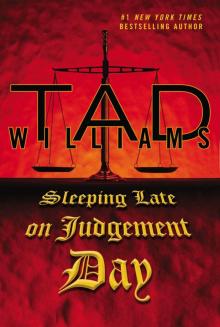 Sleeping Late on Judgement Day
Sleeping Late on Judgement Day Stone of Farewell
Stone of Farewell The Dragonbone Chair
The Dragonbone Chair Sea of Silver Light
Sea of Silver Light A Stark and Wormy Knight
A Stark and Wormy Knight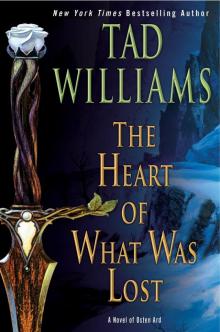 The Heart of What Was Lost
The Heart of What Was Lost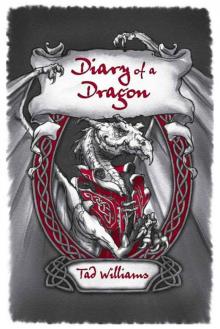 Diary of a Dragon
Diary of a Dragon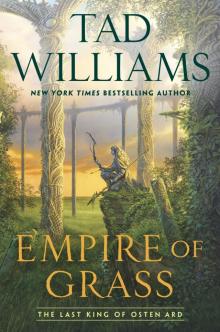 Last King of Osten Ard 02 - Empire of Grass
Last King of Osten Ard 02 - Empire of Grass To Green Angel Tower, Volume 1
To Green Angel Tower, Volume 1 The Dirty Streets of Heaven
The Dirty Streets of Heaven River of Blue Fire
River of Blue Fire The Very Best of Tad Williams
The Very Best of Tad Williams Mountain of Black Glass
Mountain of Black Glass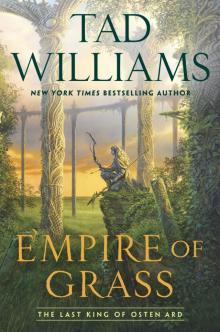 Empire of Grass
Empire of Grass City of Golden Shadow
City of Golden Shadow Happy Hour in Hell
Happy Hour in Hell Shadowrise
Shadowrise Shadowmarch
Shadowmarch Brothers of the Wind
Brothers of the Wind Shadowheart
Shadowheart Bobby Dollar 02 - Happy Hour In Hell
Bobby Dollar 02 - Happy Hour In Hell The War of the Flowers
The War of the Flowers The Dirty Streets of Heaven bd-1
The Dirty Streets of Heaven bd-1 Tad Williams - The War of the Flowers (retail) (pdf)
Tad Williams - The War of the Flowers (retail) (pdf) Shadowheart s-4
Shadowheart s-4 Shadowrise s-3
Shadowrise s-3 The Dirty Streets of Heaven: Volume One of Bobby Dollar
The Dirty Streets of Heaven: Volume One of Bobby Dollar The Stone of Farewell
The Stone of Farewell (Shadowmarch #1) Shadowmarch
(Shadowmarch #1) Shadowmarch The Secrets of Ordinary Farm of-2
The Secrets of Ordinary Farm of-2 Shadowmarch s-1
Shadowmarch s-1![Bobby Dollar [04] God Rest Ye Merry, Gentlepig Read online](http://i1.bookreadfree.com/i1/04/06/bobby_dollar_04_god_rest_ye_merry_gentlepig_preview.jpg) Bobby Dollar [04] God Rest Ye Merry, Gentlepig
Bobby Dollar [04] God Rest Ye Merry, Gentlepig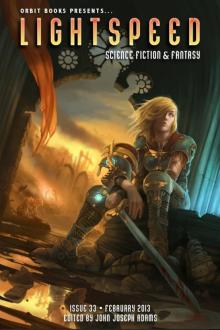 Lightspeed Issue 33
Lightspeed Issue 33 Sea of Silver Light o-4
Sea of Silver Light o-4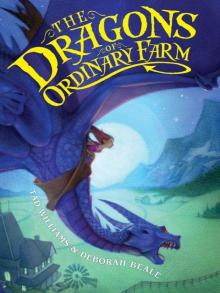 The Dragons of Ordinary Farm of-1
The Dragons of Ordinary Farm of-1 Shadowplay s-2
Shadowplay s-2 (Shadowmarch #2) Shadowplay
(Shadowmarch #2) Shadowplay